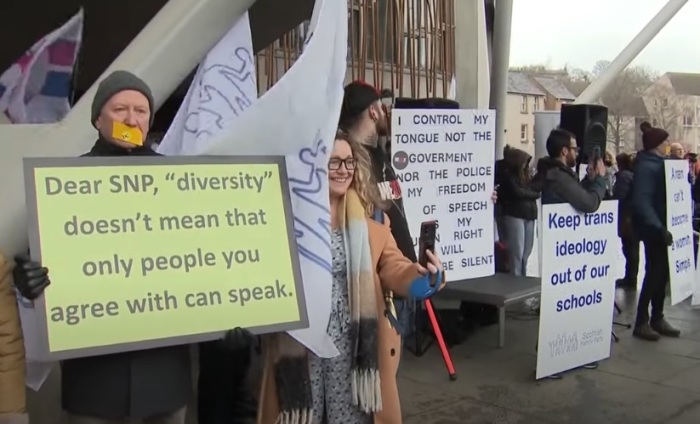Scotland's new hate crime law sparks protest; JK Rowling dares police to arrest her

Hundreds of people gathered outside the Scottish Parliament on Monday to protest new hate crime laws that critics have called a danger to free speech and civil liberties.
The Hate Crime and Public Order (Scotland) Act creates a new criminal offense of "stirring up of hatred" and came into effect on April 1. It carries a penalty of up to seven years in prison, a £10,000 (about $12,500) fine or both.
Police Scotland and the Scottish Government define hate crime as "any crime which is perceived by the victim, or any other person, to be motivated (wholly or partly) by malice and ill-will towards a social group," but police will log 'hate incidents' even where no crime has been committed.
Its opponents have said it will be used to silence critics of transgenderism and people with conservative beliefs on social issues.
Harry Potter author JK Rowling — who resides in Scotland — dared the Scottish police to arrest her for calling a list of trans women men on X, formerly Twitter.
Prime Minister Rishi Sunak has come out in support of Rowling, saying, "'people should not be criminalized for stating simple facts on biology."
Tory peer Zac Goldsmith likened the impact of the act to living under the Stasi, the secret police who terrorized East Germany before the fall of Communism. Goldsmith said Rowling was "taking risks on behalf of all of Scotland — women in particular".
"It's hard to believe any politician thought it a good idea to [introduce] these Stasi laws but they have and they can be stopped — if enough people openly challenge them as JK has," he said on X.
The Scottish Family Party led a protest outside Holyrood where people held placards saying, "We hate the hate crime laws" and "The SNP are the hate crime monsters" — a reference to the SNP's 'hate monster' advertising campaign that ran in the lead-up to April 1.
Conservative Anglican blogger Adrian Hilton said the new laws were "rolling back centuries of liberal philosophy and Enlightenment progress."
Evangelical apologist David Robertson called the new laws "crazy" and warned that shifting the definition of a hate crime to the perceptions of the supposed victim "will help modern Scotland become more of a police state — and less tolerant and inclusive".
The Free Speech Union said the act "will be a disaster for free speech in the country, pouring further fuel on the raging fire of cancel culture."
The hate crime legislation was spearheaded by Humza Yousaf, the first minister, when he was justice secretary in Nicola Sturgeon's government.
The Free to Disagree campaign group, whose members include The Christian Institute, said there was considerable "public anxiety" about the impact of the legislation on civil liberties and that the new approach was "unworkable".
Professor Adam Tomkins, the John Millar Chair of Public Law at the University of Glasgow, told the Scottish Herald newspaper that "a great deal of police time is now likely to be wasted having to deal with and dismiss ill-founded complaints made by people who are offended, upset, hurt or distressed by something someone else has said."
"It is not a crime to offend someone," he said.
This article was originally published by Christian Today.




























